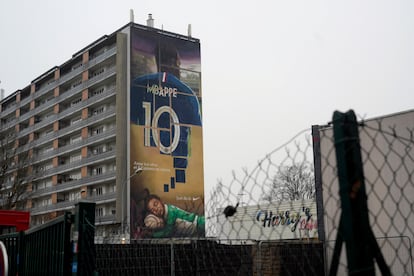In Mbappé's ‘banlieue,’ where the message against the far-right resounds but does not always convince
In the streets of Bondy, one of the poorest towns in the country on the outskirts of Paris where the France captain grew up, lack of interest in the legislative elections is palpable


In Bondy, the suburb of Paris where Kylian Mbappé grew up, almost everyone has heard what he said. Last Sunday, at a press conference from Düsseldorf, where he is taking part in the European Championship, the France captain urged young people to vote in the upcoming legislative elections, brought forward by President Emmanuel Macron after the setback he suffered in the European ballot earlier in the month. They have listened to him, as they did other athletes who have raised their voices against the extreme right. But soccer stars do not convince everyone here. Some say they will not go to the polls.
Bondy, with 52,000 inhabitants, is part of what is known as the banlieue. At 12 kilometers (miles) northeast of Paris, here one is both very near and very far away from the capital. Separated from it by the periphery, the great ring road marks the limits of the big city. This locality is famous for being the place where Mbappé grew up. William Saliba, another member of the France national team, was also born here.
In the square in front of the train station, which connects the town to Paris in less than half an hour, there are posters of the France team stuck on columns. Not far away, in a large block of apartments, a mural pays homage to its captain: a child sleeps hugging a soccer ball and dreams of the French national team’s number 10. The image is accompanied by a phrase: “Love your dream and it will love you back.”
Jean-Michel is 31 and prefers not to give his last name. He has been living next to this mural for three years. He has heard Mbappé's statements “against extreme views and ideas that divide people,” as well as those of France international Marcus Thuram, who called for the public to vote against Marine Le Pen’s National Rally (RN) in the June 30 and July 7 elections. “I think statements from sportsmen about going to the polls have an impact, it’s important for young people,” he says as he waits to pick up food at a small burger joint in the area. But he, personally, is fed up: he won’t vote. “You always have to make a barrier [against the far right],” he says with a tone of resignation, adding that he voted for Macron in the last presidential election just to prevent Le Pen’s victory. Now he will no longer do so.
The far-right RN swept the June 9 European elections with 31.5% of the vote and polls place it as the leading force in the legislative elections, ahead of the coalition of left-wing parties and Macron’s centrists. Bondy, however, voted mostly to the left: La France Insoumise, Jean-Luc Mélenchon’s party, won 45.7% of the vote. It was followed, by a distance, by Le Pen’s formation (16.7%) and the traditional right (9.6%). Macron’s list garnered just 7.5% of the vote. Seine-Saint-Denis, where Bondy is located, is the department with the highest poverty rates in the country, according to the French Inequality Observatory.
In Bondy, where many people are second- or third-generation French, not everyone believes that their vote will make a difference. In the last European elections, abstention in the town exceeded 61% of the census. In the 2022 presidential election, it bordered on 40% and in the first round Mélenchon obtained more than 53% of the vote, followed by Macron (18.9%) and Le Pen (11.7%).
At the Léo Lagrange stadium, the Bondy Sports Association, where Mbappé took his first steps, trains. Groups of children run from one side to the other, while the coaches shout instructions. On a nearby running track, two young men train in the open air: Idriss and Ilyes, both 22, born in France and whose families are of Algerian and Moroccan origin, respectively. They, too, will not go to vote next week.
“There’s no progress”
“There’s no progress. If voting served any purpose, it would have been banned a long time ago,” says Ilyes, attributing the phrase to French comedian Coluche. He does believe that what Mbappé said carries some weight, but it didn’t change his mind. Besides, he says, it’s too late to sign up now. Asked if he is afraid of the extreme right coming to power, he shrugs. “I’m French. What are they going to do to me? What I feel sorry for is for those who are coming.” His friend concurs. “They attack the weakest,” he says. For them, the media bear a great deal of responsibility for the situation, by focusing on issues such as Islamism or the veil, when there are “many other problems.” Both believe they would be better off elsewhere. And they say flatly that when they can leave the country, they will.
Thierry Pointeau, 66, is the president of the Bondy Sports Association. He knows Mbappé well. “I saw him being born, he was with us, we were always together,” he says. He is not at all surprised that there are people who have no intention of going to vote. “For years, they have abandoned us. As such, there comes a time when people no longer believe in politics, even if some politicians are sincere and do a good job. Now it is difficult to climb back up this slope,” he says over the phone.
He does not doubt, however, the influence that Mbappé and other athletes have among younger people. “I agree with them 2,000%. It is no longer enough to fold your arms, to say nothing. With what is happening on the fields, in the stadiums, with the racist chants. If they don’t mobilize, I don’t know who will. They are absolutely right,” he says.
Idriss and Ilyes do some warm-up exercises before they start training. Two boys accompanying them, aged seven and nine, mimic their actions. While the older pair give their opinions on the choices and statements of the athletes, one of the little ones asks: “What did Mbappé say?”
Sign up for our weekly newsletter to get more English-language news coverage from EL PAÍS USA Edition
Tu suscripción se está usando en otro dispositivo
¿Quieres añadir otro usuario a tu suscripción?
Si continúas leyendo en este dispositivo, no se podrá leer en el otro.
FlechaTu suscripción se está usando en otro dispositivo y solo puedes acceder a EL PAÍS desde un dispositivo a la vez.
Si quieres compartir tu cuenta, cambia tu suscripción a la modalidad Premium, así podrás añadir otro usuario. Cada uno accederá con su propia cuenta de email, lo que os permitirá personalizar vuestra experiencia en EL PAÍS.
¿Tienes una suscripción de empresa? Accede aquí para contratar más cuentas.
En el caso de no saber quién está usando tu cuenta, te recomendamos cambiar tu contraseña aquí.
Si decides continuar compartiendo tu cuenta, este mensaje se mostrará en tu dispositivo y en el de la otra persona que está usando tu cuenta de forma indefinida, afectando a tu experiencia de lectura. Puedes consultar aquí los términos y condiciones de la suscripción digital.








































